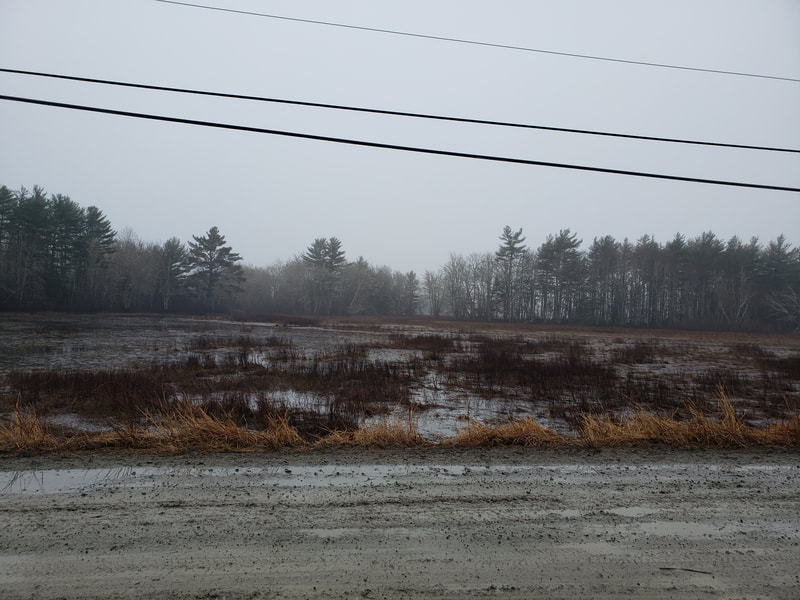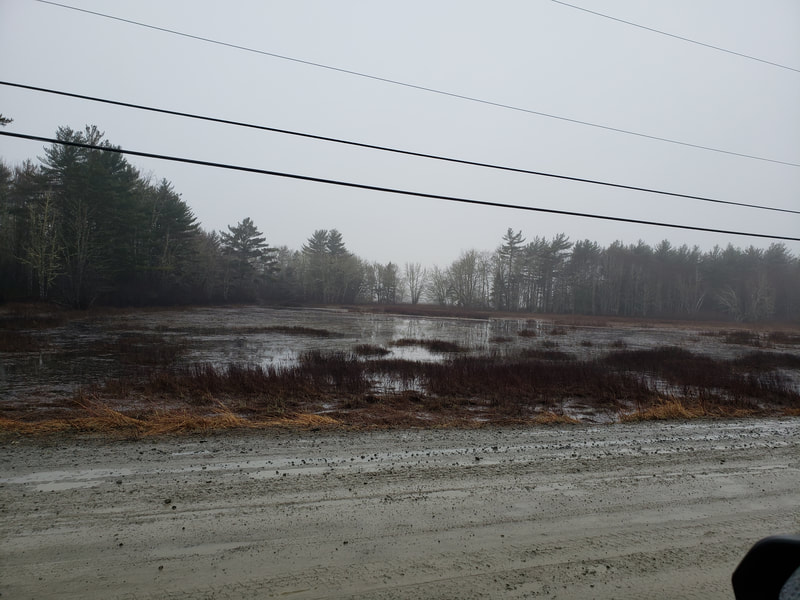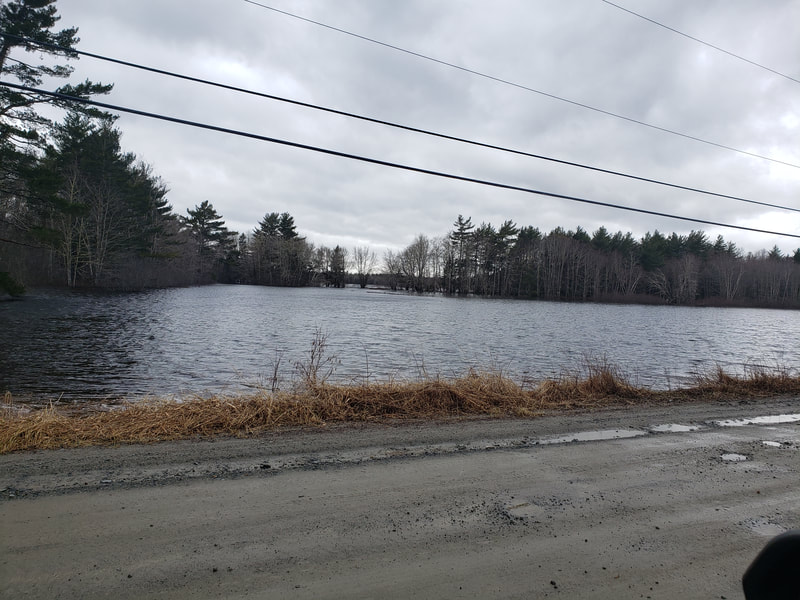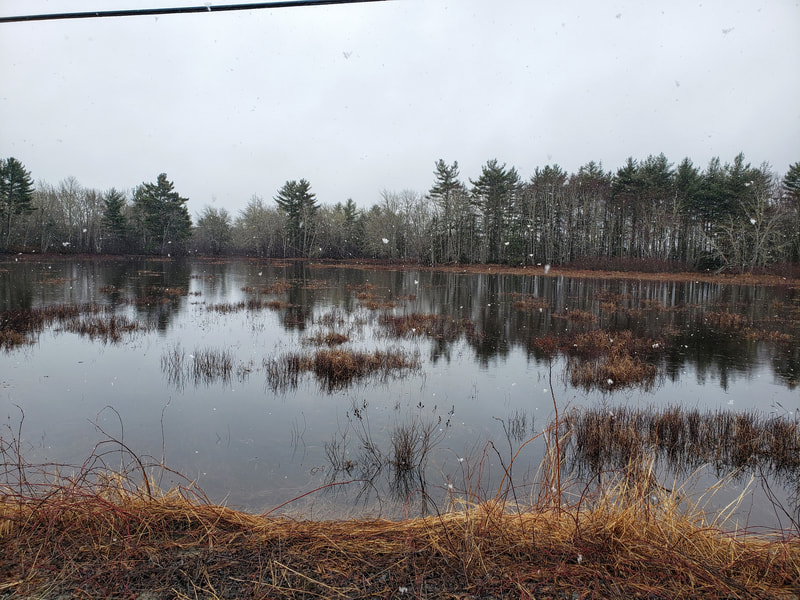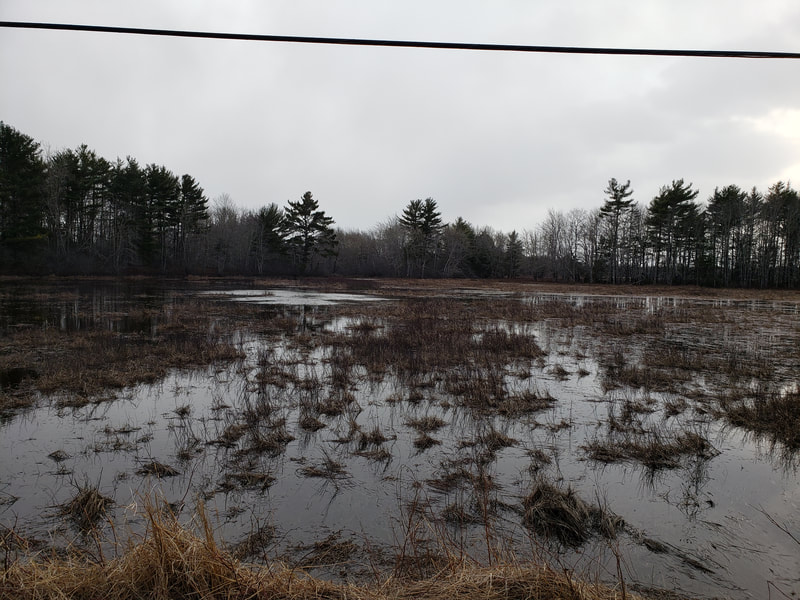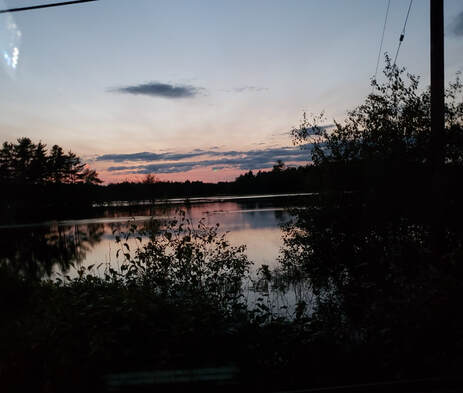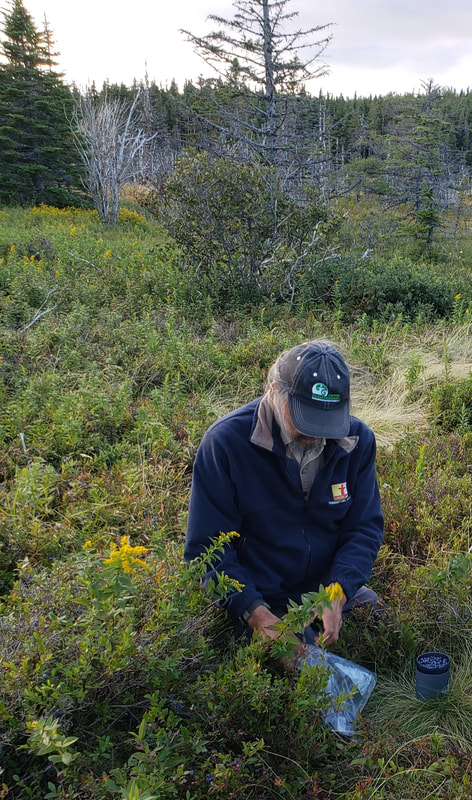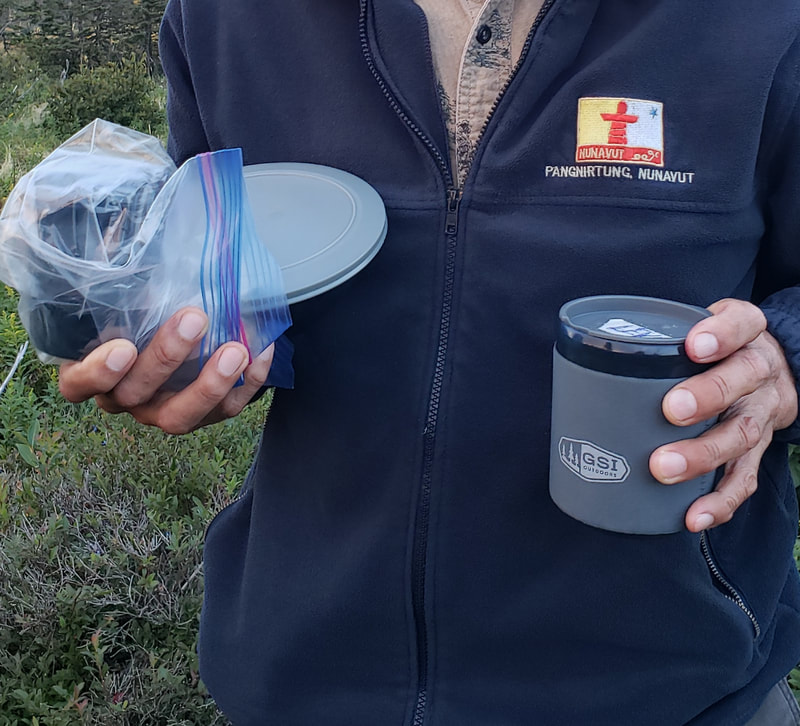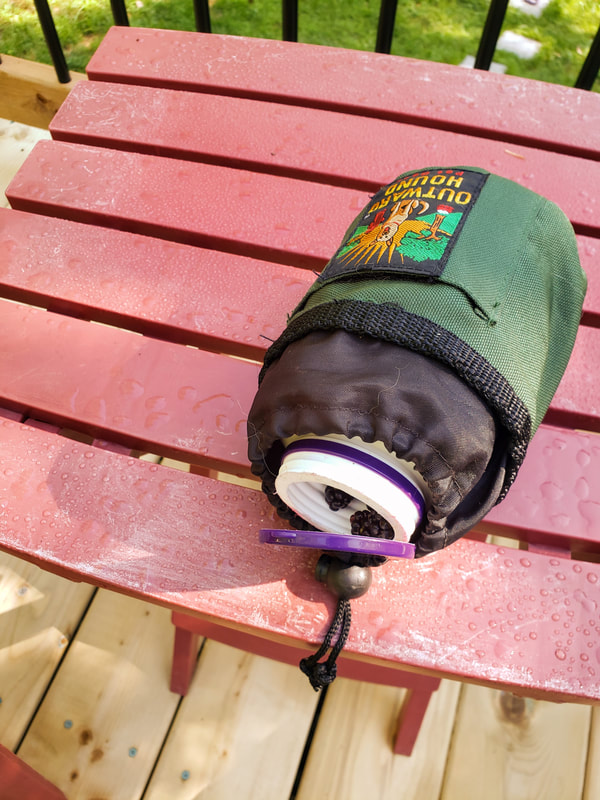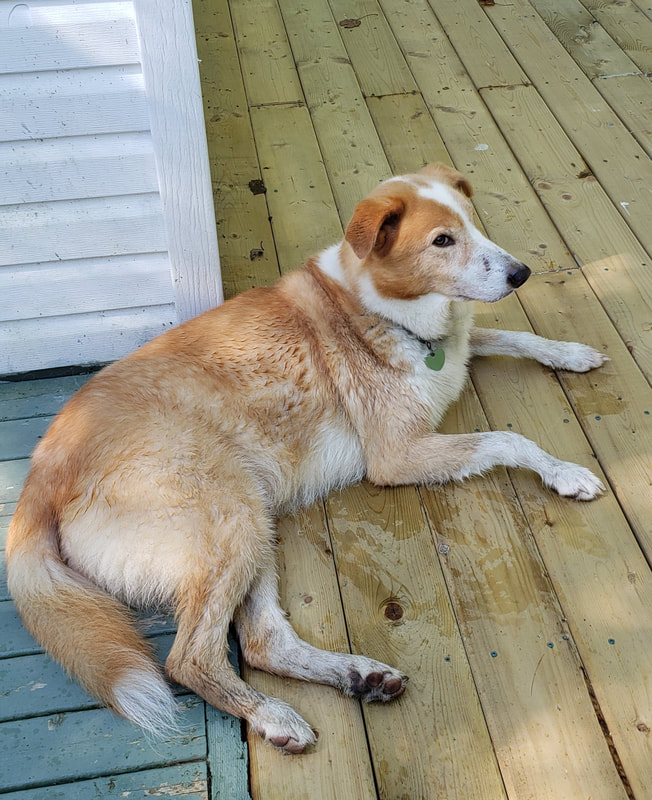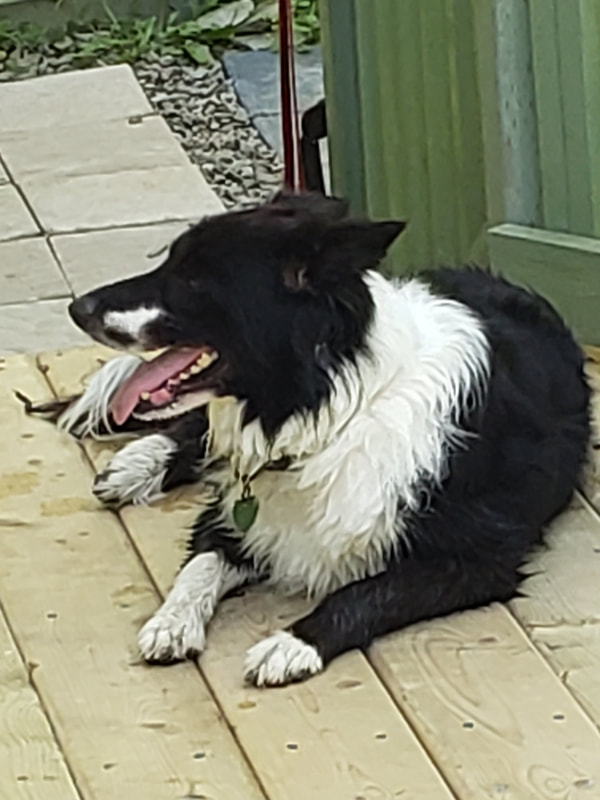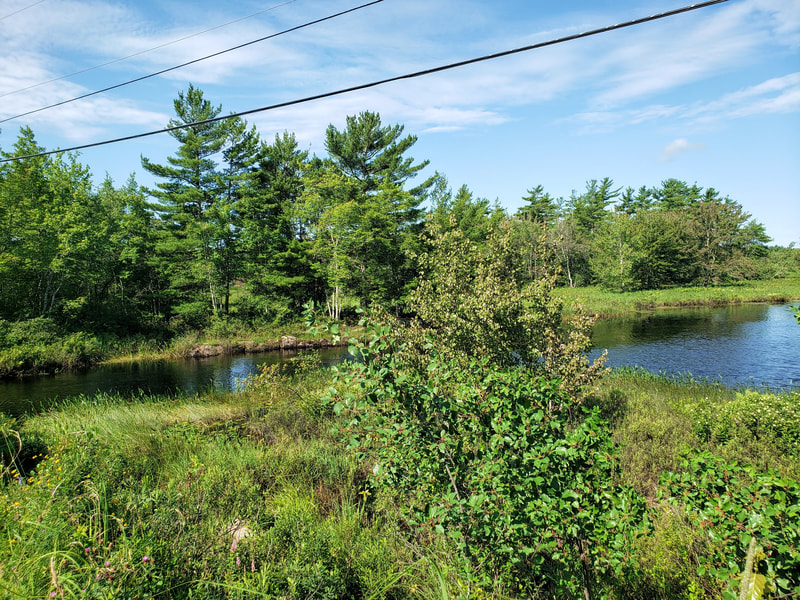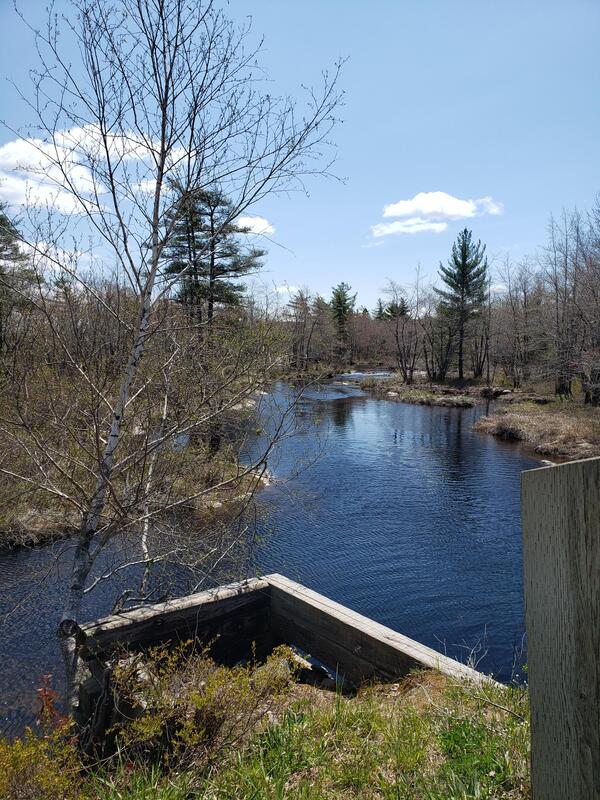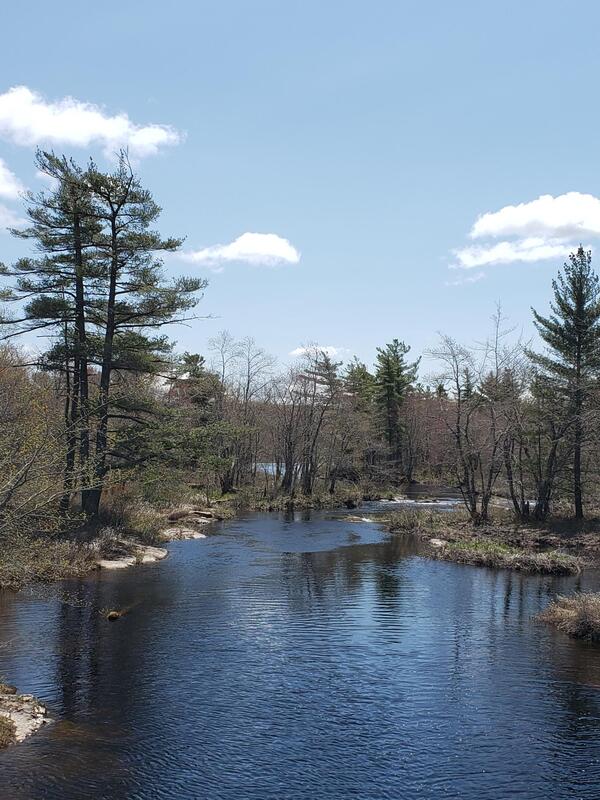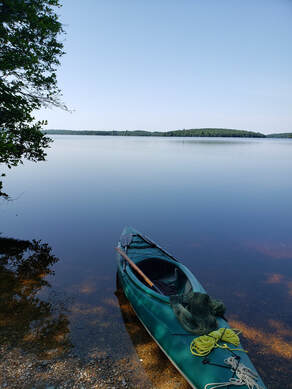AuthorAnne M. Smith-Nochasak: Archives
July 2024
Categories |
Back to Blog
One Dog's Festivitas7/7/2024  Often, I write about nature. Today, I write in tribute to the miraculous Flo, who passed suddenly from our midst on July 3rd, 2024. On June 29th, 2022, Flo came waddling out to greet me in the waiting room at the shelter. Before her rescue by these good people, she had been abused, confined, and overfed. She should have weighed just under forty pounds, but weighed seventy-five. She cringed at the sight of paper, at the sound of a raised voice, at the sight of a male person. Yes, she was very damaged. She still walked up to me, eyes glowing, and rested her chin in my hands. The bond was immediate and permanent. Flo looked directly into my soul, and loved me anyway. Flo was not an easy dog. She barked at the door at walk time, a shrill staccato yip that she finally managed to reduce to warbling and singing. She would then race for the gate, and the process would start again. If there was a car ride as well . . . I think you see the pattern! On walks, my gentle Shay would pace at my side, while Flo twirled at the end of her leash like an ecstatic whirligig. That was what defined her, and made her a joy--her jubilation, her celebration of every moment. Her festivitas. Was it time for coffee? Flo was going to watch! The composter needed emptying? Flo was on the way! Bed-time? Let's check the gate, the garden, the clothesline! For every trip I made to the garden with a load of water, Flo made ten, spinning around me, racing back and forth, her herding instincts in full play. Every moment, every act, was a celebration. For Flo, life was special, not a moment neglected. Most of all, she was a teacher. In that first moment, she recognized and blessed my brokenness. An abuse survivor herself, she taught me that every abuse survivor is worthy of great love and that the love given by an abuse survivor is pure, not tainted. She was healing for me. She loved her Shay, coaxing her from her own grief over the loss of her beloved mentor and guide, Mikak. She taught Shay to play again, to share again, to watch her dish when a hungry Border Collie was near. She zipped everywhere, and those extra pounds fell away. She grew sleek and lithe. Festivitas. Merriment and celebration. These were the gifts Flo brought to her home. And let us not forget dancing. Flo loved a good beat and would bark with enthusiasm, twirling in circles, giving herself a shake from head down to tail, ending in a little kick. She loved Jingle Bell Rock and The Tennessee Flat-top Box, and especially the spiritual I'll Fly Away. But it had to be sung with gusto. With festivitas. On July 1st, 2024, she barked for her car ride to the Park. During the day, lameness set in. She had stumbled earlier; had she pulled something perhaps? It worsened and in the night we participated in a vet video consult; the gentle vet was concerned about neurological sources and urged us to get her to our family vet. The family vet in town sent us immediately to the Veterinary College for neurological assessment and surgery, a mere five hours away and we headed straight from our vet's office. Generous neighbours took over the care of Shay. That evening when we arrived, the neurological team met us with a gurney; neurological tests and CT scan were completed. Flo had now lost all use of hind limbs, and had no pain response. Surgery might go ahead if it would be helpful--and safe. But the progression was alarmingly fast. On the morning of July 3rd, Flo was very weak, and the team recommended we take her home to say goodbye. I sat in the waiting room while they brought her out. She was very damaged. And somehow so small. She still walked up to me, eyes glowing, and rested her chin in my hands. Flo looked directly into my soul, and shared her strength. We had a wonderful car ride at first, sharing the music, telling the stories. When I scooped her out and placed her on the grass, she flopped on her side, writhing, her legs refusing to obey. I knew what lay ahead, when the paralysis reached her chest. I made the call. I sang I'll Fly Away as she passed, and sang it again over the beautiful grave overlooking her gate and her garden, the resting place my neighbours prepared. And when my time comes, do not be sad. Sing I'll Fly Away, please. Roar it out and dance and clap. For somewhere, a Border Collie and I will be dancing. Forever Flo. Forever festivitas. Thank you for your gifts, dear friend.
12 Comments
Read More
Back to Blog
Spring Surfacing4/25/2024 I cannot read the opening chapter of the Book of Genesis without breaking down. To be present at the birth of creation, to witness its wonder-- what greater gift could there be!
And yet, we receive this gift every year, as the earth comes full circle to renew itself. Creation really has no beginning and no end point; it is an act that is continually arising, forever arriving. On a cosmic scale, to witness the birth of a star. On a microcosmic scale, to witness the birth of a meadow, like the one in the pictures above, returned to us after the long sleep of winter. "Now the earth was formless and empty, darkness was over the surface of the deep, and the Spirit of God was hovering over the waters." (Genesis 1:2 NIV) For the meadow is there, drawing from the regenerative power of nature, but we do not see it, except as a memory. "And God said, “Let the water under the sky be gathered to one place, and let dry ground appear. And it was so." (Genesis 1: 9 NIV) The meadow lifts from the depths, reaching into the light not all at once but incrementally. Rising, drawing back, thrusting upward again, perhaps to stay for a season. "The land produced vegetation: plants bearing seed according to their kinds and trees bearing fruit with seed in it according to their kinds. And God saw that it was good." (Genesis 1: 12 NIV) Ah! That is not yet, but it comes so soon. A hint, a cautious leaf protruding, and soon there will be deer grazing in the evening, song birds flitting among the reeds seeking seeds or insects, ducks nesting near the water. And yes, it will brown and wither and fade and withdraw beneath the waters again. The meadow is there beneath the surface, sleeping and dreaming of what has been and what will be. Spring acknowledges destruction and crucifixion as it calls us into creation and resurrection. I acknowledge that this is a little late for an Easter reflection. It is never, however, too late or the wrong season to celebrate the miracle of natural law, forever in balance in itself, forced out of shape by us and yet we wait for God to fix it. Spring will come, with or without our blessing, perhaps a crippled spring struggling to surface in a wasteland, elsewhere lithe and supple in a new world. Spring is waiting beneath the surface of the waters, listening for the spirit that forever hovers across the surface. Spring is an unborn idea or dream or story, awaiting its moment to be drawn up into the world.
Back to Blog
An Offering of Faded Flowers2/14/2024 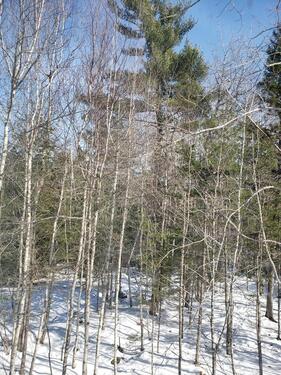 Valentine's Day is here again. We bring to it our hopes, our wishes, our dreams of a world lit by love. Some visualize candlelit dinners, soft music, foreheads almost touching as sweet promises are whispered. Others scrub glue onto paper bags, affixing stickers and paper hearts chopped from construction paper, anticipating them stuffed with bundles of valentines, imagining delighted smiles as their own offerings are received. Somewhere a parent carefully places one more bud on the iced cake, while cross-referencing one last time ingredients with known allergies in their child's class. Everything must be perfect for this joyful day of hearts, flowers, and the celebration of love. When the party is over, the stickiness and crumbs addressed, the bits and scraps of cupids and bows brushed away, do you see that child, shoulders hunched, clutching the heavy tin they came in with, still packed? Is that their empty paper bag, crumpled in the recycling bin? Can that be one of the valentines they made, to all their best friends forever, now a little bent, tracked and damp on the hallway floor? The sandwiches were proudly borne from desk to desk, an offering, but everyone was too full, eyes on the curling crusts, a little dry. Elsewhere in the room, a crayon-caked card dropped to the floor, as the eyes turned away. One child's valentine bag was not stuffed like the others; it remains flat, a little crumpled. May I have a sandwich to take home, maybe an extra? They do look good. You put a lot of effort into this card; you thought of me, thank you. Here is one for you; it is, after all, Valentine's Day. Perhaps if they learn these things, they will grow up to be like him: He wanted a gift for me, but we were there on Fixed Income, with vouchers and service vans to the chemo centre, and no budget for roses. But there was a shawl display in the Dollar Store, in deep burgundy or teal blue, one for his daughter and one for me. First choice to me, he said with quiet dignity. Eleven months ago, I wrapped the deep burgundy shawl about my shoulders one last time. I huddled in a chair and played all the music from the International Tattoo of 2011, the one he worked with the Canadian Rangers. I studied the pictures, and marked the time of the service, the eulogy, the burial. Today, I want to see his Valentine's Day greeting on Messenger, never fancy or ornate, but "Happy Valentine's Day, I love you" said it all. I long to look, but then I must also see our last chats, just after we knew, and the message he didn't see. There are many bearers of one last message, unread, many wrapped in Dollar Store Shawls, more precious than mink. And yet we smile this day, just like the happy people. For we have been loved and are still loved. When the wine is consumed, the dessert lingered over, the candles extinguished, and night has closed in, when the afterglow of romance has faded, will there still be flowers? Will there be glamour and a little mystery, not roses perhaps but, just possibly, a faded bouquet, an offering beyond price? Happy Valentine's Day. All love is precious. All love is beyond price.
Back to Blog
The Hermit Community1/16/2024 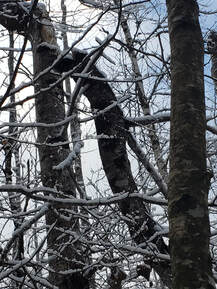 Winter has arrived in the woodlands, and the silence settles around us. Sometimes, it is a comforting blanket, shielding us; other times, it crowds close, suffocating us. Today, I pause to reflect on the community that is formed in such places. In The Monastic Journey, Thomas Merton dwells on the monastic calling not, like many of us assume, as a call to reject society, but as a summons to enter it more fully. I guess this makes sense -- sometimes being apart draws us to contemplate that which we love, and in our separation, we recognize what makes loved beings, places, and things special. It magnifies the beauty, while gently blurring the lines of failure. This does not mean that we deny the realities of the world, but that we look past these, to celebrate what the world can be. I was surprised to learn that Merton considered the hermitic calling to be an extension of the monastic calling, kind of an ultimate call to community. Here, one loves and interacts with the world without coming into contact. The hermit embraces life, it seems, while no longer requiring a physical reference point. That would be an ultimate participation in the world -- an appreciation transcending the boundaries of space and time. 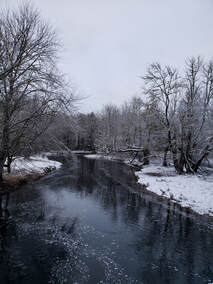 The true hermit, then, is not a taciturn misfit who hates people. This person is, instead, one who has integrated fully with life itself -- one who loves completely and with an enduring love. I love the sound of that, but it is an ideal. We look out for each other here, and we love the tranquility of the snowy woods, but we are by no means of monastic or hermitic mindset. Now, we might see glimpses and flashes of monastic-like peace, but the realities of daily living are never far away. Today, a truck and trailer slid backwards down the big hill to rest sideways with the trailer pressing into the woods on one side, and the truck leaning into the ditch on the other. We sympathized with the driver while eagerly anticipating open roads and town amenities. On a more drastic note, there was a couple trying to reach a medical appointment. In such moments, we are very much world dwellers, driven not only by consumerism, but also by need. There are, however, the moments when any of us anywhere might have a flash of memory of a loved one, separated from us by distance and time, perhaps deceased. And in that instant, we experience an outpouring of love. I guess the ideal hermit would feel that way all the time, but for the rest of us, these moments are sweet intervals in our lives in the world. For me, it comes down to Anna Caine's discovery in The Ice Widow: "But your spirit is free upon the Land, and I will find you there. I will reach and find you from anywhere in the universe." (217) In all our separation, in all our longings in our journey, our connections, when they are strong, will transcend all. And that is more than enough for me.
Back to Blog
The Unknown Author Goes to Market12/11/2023 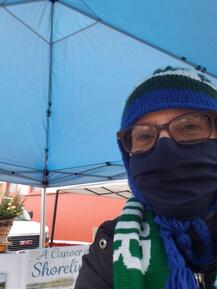 My favourite writing moments are rooted in the natural world. I paddle along a river or a lakeshore, meditating on the delicate properties of the landscape, drawing spiritual strength from the earth's teachings. Lately, I have been out of touch with that world as I spin through the days, preparing for Christmas markets by night and dashing into school in the morning to learn the full details of my substitute teaching assignment for the day. There are not enough teachers to go around, but but the students and staff are amazing, and everyone pitches in to make it work. This is also the season to market one's self-published novels! Someone recently observed that it must be nice to be able to sit around and write, doing as I please. I quite agree that it must be nice! The reality is that a writing session, although pleasant and creative, is also exhausting. The writer sinks into a special world, creating, scrapping, recreating.... and that is just the beginning. Editing and revising involve intense focus, for we are breathing life into our vision, not merely checking the spelling. Getting the book into publishable form involves long hours of hard work. And then, before during, and after publication, there is Marketing. Books somehow refuse to sell themselves. Why do I go to farmers markets, craft fairs, and book fairs? Do I sell lots? Sometimes I do, but mostly I pass on information. I am an unknown author, whose audience is often discovered in face-to-face encounters. If I remain at home, I will be an unknown author, but no one will even know that much. Now, when I go to markets, there is a sense of "There goes an unknown author!" I consider that progress. I am, some are surprised to learn, an introvert. I am learning to manage this challenge, terrified as I drag my tent from the car, feeling the dreaded imposter syndrome crowding me. So what keeps me going? The online community reposts and cheers me on. "Tell us how it went," they say. They read my books and are generous in their comments. There is a fellowship there that runs deep. The market community rushes in to help me set up, offering welcome and encouragement in a genuine camaraderie. People drop by to chat and share stories, or simply to welcome me to their community. I meet other aspiring authors, and we swap strategies and share dreams. Established writers at book fairs offer encouragement, treating me as a colleague, not the lesser being my introverted self whispers that I truly am. I wonder if all these people really know the difference they make in one introverted unknown writer's life. So, I go to the markets. I have learned to keep a pen warm in an inner pocket for outdoor markets, to pack many light boxes because I have lifting restrictions, and to listen to the market world around me. It is a little like paddling the shoreline, observing, absorbing, and learning. And ever grateful to the online writing community, the physical writing community, the marketing community, and the market patrons, who teach me another side of the wonder of life. Blessings and best wishes to you all. I hope these words reach you; you are making a difference in the world. Thank you.
Back to Blog
We Are Storytellers10/27/2023  A rough desk from the secondhand shop faces the east window overlooking my woodlot. I retreat here on my afternoons off to prepare marketing materials, write queries, and write my stories. It does not matter what I write or how much; it only matters that I engage in the writing process. Sometimes, much of the afternoon is spent reviewing an outline or reading and editing previous work, but I love to finish the afternoon with fresh writing, sinking into my writing world and letting the story, for better or for worse, carry me. In this space I become one with the world, sharing in our common identity as story tellers.
A vendor at a market once advised me: "You have your story to tell. But be sure to listen to the stories of the people who visit your booth. Their stories are important too." Oh, the stories I have heard! I would love to tell them all, and show you how attentive I have become, but these are not my stories to tell. Through them, I have begun to realize that each of us has special stories to share, and by sharing them, we become one. In Halifax one day, I was regaling a visitor at my booth with the challenges of marketing, or so I thought: We had to wade to the parking lot through water over our ankles; market tents were collapsing, and roads were closing. He listened politely, and then he asked of I had followed events in Chennai in 2015. Calmly, and with gentle grace, he told what it was like to be there, the horror and yet the profound humanity revealed. It was humbling. I would like to share his story, but it is not mine to tell. One day, when he shares it with the world, it will enrich us all. Until then, I carry brief moments in my being. I was asked recently to share some experiences from the North, perhaps including polar bears. My son and his father have both participated in the traditional hunt, and it is long, hard work, requiring skill, strength, and patience. The experiences that are deep in my soul, however, have more to do with the little moments between the breaks, the moments of brokenness and of hope. My stories in The Ice Widow are my response to the encounters of my life; they are the stories of grief and joy that rise when we are present to one another. Recently, I returned to the classroom as a substitute teacher. My second day, I arrived in a classroom at writing time, my favourite thing! Along with Math, Science, Social Studies, Reading, Art, and a few others. I always loved making little stories and plays for and about my students; trust me, when they read a mystery in which they each had a role, reading became fun! These young people reminded me of why writers write. The eyes were shining as they shared details about their heroes and villains, their settings, the problems the hero would face, and so on. When I asked one student whether he had worked out the resolution yet, he grinned. "Maybe," he said, his eyes alight, "there won't be a resolution. Maybe, you'll have to read the next one to find out!" Definitely, there was an invitation to enter a story world here. At a market recently, a teacher observed that students lose their joy in writing when it becomes a task. They are story tellers, and that is their joy! Let the story out, celebrate it, and let the shaping take place another time. Celebrate telling the story. I can only imagine the creative energy of that classroom! We are all story tellers, but let us take Thomas King's insights to heart: They are wondrous, but also dangerous, and we must be careful what stories we release into the world for they can never be called back. (The Truth About Stories, 2003 Massey lectures) Perhaps, I am thinking, not every story should be told. But the authentic stories, the uplifting stories, let us listen for these. We are story tellers -- some stories published between covers, some in the classroom or in the market place, or on street corners. We are all story tellers; let us embrace the stories that define us all, and join in this celebration of our humanness.
Back to Blog
Leaning Into the Day9/25/2023 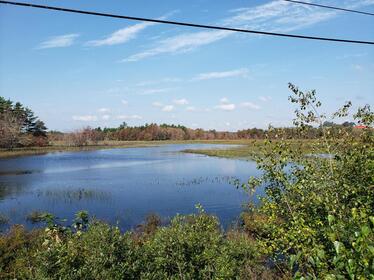 Autumn has arrived. This is my favourite season, and yet today I am not content. My life has become a jumble of technology, the days tumbling together as I rush to complete a post, run an ad, respond to a request, develop a collage.... Last week, I spent three quiet days with minimal technology. I drafted reviews on the backs of sell sheets, jotted manuscript passages on loose leaf, read by candlelight, and listened to the night sounds. Occasionally, I activated my little generator to keep the freezer cool, warm up food, and heat some water. Like me, though, this generator does not respond well to pressure, and does not want to discover its personal breaking point. I enjoy and use technology, and I recognize its importance, but sometimes, some of us need a break. Take today for example. I returned from a coyote-free walk with my dogs, and since yesterday I had caught up on yard and garden, and even given attention to laundry and vacuuming, I had many necessary online projects planned. Instead, I headed to the river for a short paddle, heading downstream along the floodplains this time. Usually, I prefer the little channels and winding ways upstream; it is more intimate somehow. The way downstream is so broad and open, but it is invigorating and has its own beauty. I chose downstream today. The maples along the floodplain were of the gnarled, stunted variety, and by this point in September there were many sleek grey limbs exposed. There were, however, some leaves remaining this morning, clusters of rusted reds and oranges, dull greens tinted with yellow. The marsh grasses swayed on the banks, earthy green with brown highlights. I found the hiding place for my protagonist's boat in the shaded cove below the old farm, saw her secret neighbour's route along the flooded trail, pictured her discovery of the boat, traced this person's route as far as the turn, imagined her fumbling and splashing, struggling to her rendezvous. I would not allow her the headwind I had; she would need a calm day. This is a small but pivotal scene, and I smiled to think I was working. Research is sweet when it is experiential. There are no ducks on the water. No swallows dip and dive. This is autumn, my favourite season, yet it has come too soon, and I am not ready to embrace it. My seasons crowd around me, and there are too few left. Family history suggests I have about seven good autumns ahead -- such a small number, it seems. I draw my paddle along the surface, right, then left. Voices rise around me, reproaching my unwashed floors, my unanswered messages, my lack of camera to capture the moment. The strokes become even; the voices, the thoughts, the undone things fade. The kayak skims forward, leaning into the day. The morning becomes mine, and if this is my last season, or my last moment, it no longer matters. Nothing in nature is wasted. I rise from the water, the day clean in my being.
Back to Blog
Clear-cut Revisited8/28/2023
The next summer, I first discovered blackberry bushes rising in wisps beside the logging road. The berries hung thick and green on the boughs, a few more ripening each day, eagerly awaited by the birds, the bears, and me. I learned that in late August and early September, if I went daily, I would find a few fresh handfuls each time.
That was the year of my friend's chemo. It was 2020, and the late summer brought a new phase in the pandemic, from lockdown days to his regular flights from Northern Labrador to St. John's, where I would join him, my once-husband, my forever friend. Although his condition was described as terminal, he was very mobile, and we spent the recovery periods between rounds touring hardware stores and visiting. A friend there took us blueberry picking one blessed, soft evening in early September, far from the city and the chemo centre. She thought the berries would supplement our food vouchers at the hotel, but my friend had other ideas. Every berry we picked was packed away and frozen, a gift to take back home to the family. You see, my friend was used to being a provider. This was what he had left. Mainly it was a gentle evening, a sharing of laughter, a sharing of silence. It was time shared on the land together again. During my times home, I roamed my mutilated clear-cut, reveling in aloneness far from the stresses of navigating my friend's appointments and schedules. Although the silence in my little clear-cut was welcome, mainly it conjured images of one evening of joy. It felt good, but it felt lonely. Each year I go to my little clear-cut here at home, and each year I discover Nature has reclaimed just a little more. Succession now crowds the landscape. There are no stately trees yet, just saplings and bushes packed together. Years from now, someone will look around and see that the forest has recreated itself. This August, the berry picking has been bittersweet. I look down along the hollow, seeking a glimpse of a denim jacket, a figure hunched over the bushes. My friend should be wandering the hillsides, seeking the best patches. He does not pick berries this year. Yet he is present, in every moment and molecule of my being. The bushes hang out over the logging road, heavy this morning with ripe fruit. Perhaps farther back there will be more, but the brush has grown thick there and the weeds are pungent. I leave those berries for the birds and the bears, who are generous enough to leave the road for me and my dogs. We meander along, and I listen and look. No laughter rings over the hillside as a special patch is discovered. No blue denim shifts against the green. I share the moment with the dogs, smiling as they tug at the berries and then wait for the offer of a handful, bramble-free. I have struggled with clinical depression throughout my adult life, and admittedly, this season has been hard, for the laughter will not be heard, the denim will not move against the green. Yet in nature, there are moments in which I can live as healed. I raise my face to the sky and see that the green reaches high into the blue now. The morning seeps into the gaps that press my being apart, and in that moment, I experience wellness. A breeze rises, ripples the leaves, and envelops me. Then it is gone. Nature reminds me that in each moment there is perfection, if I but embrace it. Nature is a teacher and a healer. I step forward with confidence, not studying the uneven ground at my feet. The root snags my foot, and I lurch forward. The container tumbles free; the lid pops and the berries scatter. The dogs close in. Nature, my teacher and my healer, also has a sense of humour. I smile as he would. And the morning is fully alive.
Back to Blog
Between the Bridges8/1/2023 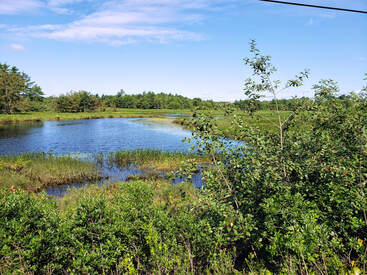 Today is a day of hope. After periods of intense heat and humidity, days and nights of severe storms and floods, and before that wildfires flaring without warning in the parched woodlands, we have a day of clear skies, gentle breezes, and a warmth that caresses us instead of beating us down. Today is a generous example of what out world can be. This is a day that summoned me to the water. Today, I did not feel strong enough to paddle on the nearby lake, the one I described in my last blog, so I left the builders and the boaters to enjoy their dreams while I pursued mine. Since Sunday, I have felt an overwhelming need to meander along the wetlands above the little bridge a few miles along the road. With surprising ease, the kayak slid over the bushes and down the embankment to the river's edge. The water was high but contained by the wetlands, and my water trail was well-defined. My course upstream appeared near, but the river brought me on a long, meandering paddle, turning many times before I reached my path upstream. Patience, the river urged, for there are trees to gaze at, waterlilies to touch, dragonflies to follow, and lessons to be learned. Patience, for the morning requires your surrender. Two Mergansers joined me briefly as I paddled, and I recalled this time of year at the cabin, when the ducklings would swim across the cove each evening, proud behind their parent as they churned their way to the creek. The water was up today, and we crossed the beaver dam without portage. Dragonflies flitted and hovered, as they had during my Amarok's last summer, as they had on the day she died out there at the cabin, seventeen but filled with the aura of a life well-lived. The dragonflies dazzled me this day as they recalled her to me. A third duck swam near, but as I approached, it scurried off into the thickets along the shore, like my lady, my Husky, swimming free at my side. My past came into my present. The journey passed like a dream until I awakened at the shallow rapids below the second bridge. Mere moments had passed, but I was there, past my goal. Returning, the current carried me. A lone deer stood poised behind a sapling at the water's edge. As my kayak drifted near, the deer emitted a sudden snort, then a series of hoarse barks as she dashed for the wood. There was too much thrashing in the woods for one; she was teaching her young, it seems. The sun warmed but did not burn. The dull sweetness of ripening meadow hay was thick in the air, recalling the taste of stale marshmallow. The edge of the wetland was rich with the energy of earth's decay and renewal. The pungent odor pulsed over the waters. Time stopped. There between the bridges, there on the wetland, Nature remains in perfect balance. Each moment speeds by, yet each moment lasts forever. It extends beyond time in the eternal present of memory. The moment between the bridges holds me; when all beauty comes crashing down, when darkness covers me, this is the moment that will breathe life into me. There between the bridges rests all I need of paradise.
Back to Blog
A Canoer Looks Forward7/13/2023  And he said to them, “Come away by yourselves to a lonely place, and rest a while.” -- Mark 6:31, RSV Many tasks were calling me, many worries enveloping me, as I returned from my walk. The morning was warming rapidly, with mowing and watering and cleaning to complete before the heat covered me. Then I could fritter away the remaining hours with developing marketing materials, studying goals, and laying plans. Writing must wait; there was too much to be done. But the water would not be ignored. I had been too long on shore, and my mind was suffocating in the dust of obligation. The water beckoned. In my heart, I longed for the river along the wetlands or the sheltered lake in the woodland, but I must go immediately: I bundled kayak and gear and headed for the nearby lake, where the summer residents gather. This was a summer morning on this summer lake, but because it was Thursday, I anticipated privacy, slipping past humble and deserted docks to the lonely places. This was, however, my first paddle on this lake this year, and the world had grown and moved without me. The growl of chainsaws, the whir of drills, and the grumble of backhoes smothered the call of loons. Along the shore, new dwellings were rising, and the hills lay raw and bare as these new pioneers stripped trees and rocks to create their sanctuaries, their personal beautiful spaces. The shore across the bay was gouged and stripped, tufts of natural greenery wedged between the lots, massive docks protruding, frames rising in some places, squat trailers claiming the space for now. I paddled up the river that fed the lake, and even along its secret places, the earth was stripped to the water's edge. I wanted them all to go away, but then, by what right do I decide the future? On whose authority do I refuse their presence? 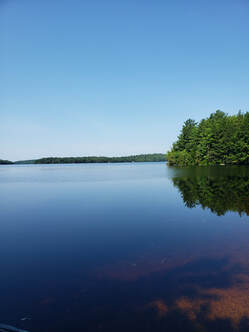 Each person, here on this lake, has a dream. As I gazed over the wild places, I realized that they saw these, too; they recognized the glory of an untouched Nature watching over them. Their feet might be planted in the exposed rocks and earth, but they saw gardens and shade trees, docks with deck chairs in a row, little beaches where their children would splash with their buckets, growing strong and wise in the presence of Nature. They would carve out a place of beauty, with the wild places close and sheltering. They would make their dwelling place here, and raise their families far from the madness of our world. Their dream is my dream, only with more money. Is that what bothers me? So I will acknowledge their dreams, and paddle on to mine, there in the lonely places that are a little farther away, but still to be found. There will always be places where loons are waiting. If I do not believe this, then I am without faith, without hope. And therefore without love. There is room in my heart, and on this lake, for all our dreams. And now, it is time to write, not a scrambled reflection for social media, but a story to bring me peace, as it did in my Wasaya Times. Paddle well, my friends. |
ANNE M. SMITH-NOCHASAK
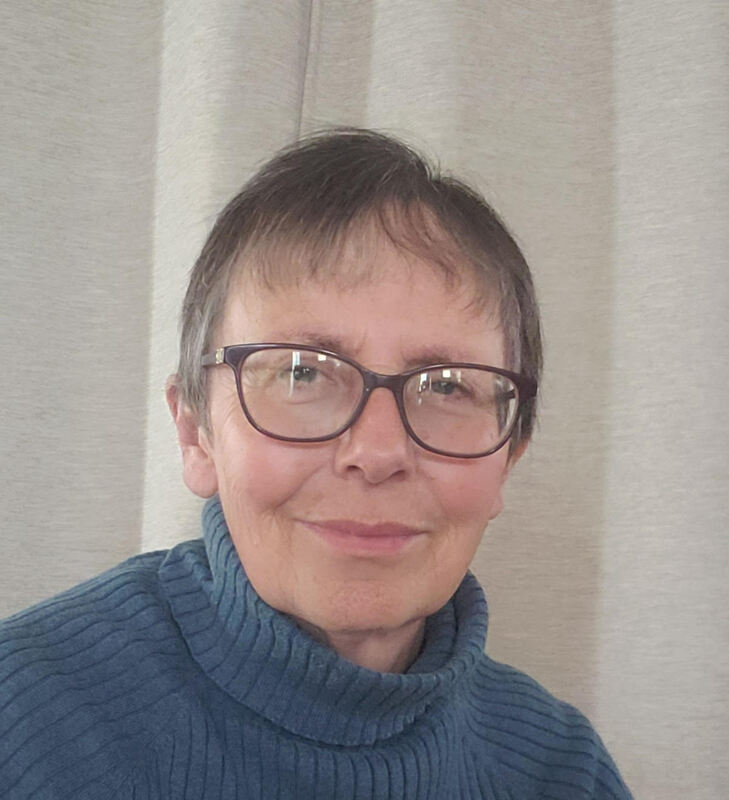
 RSS Feed
RSS Feed
